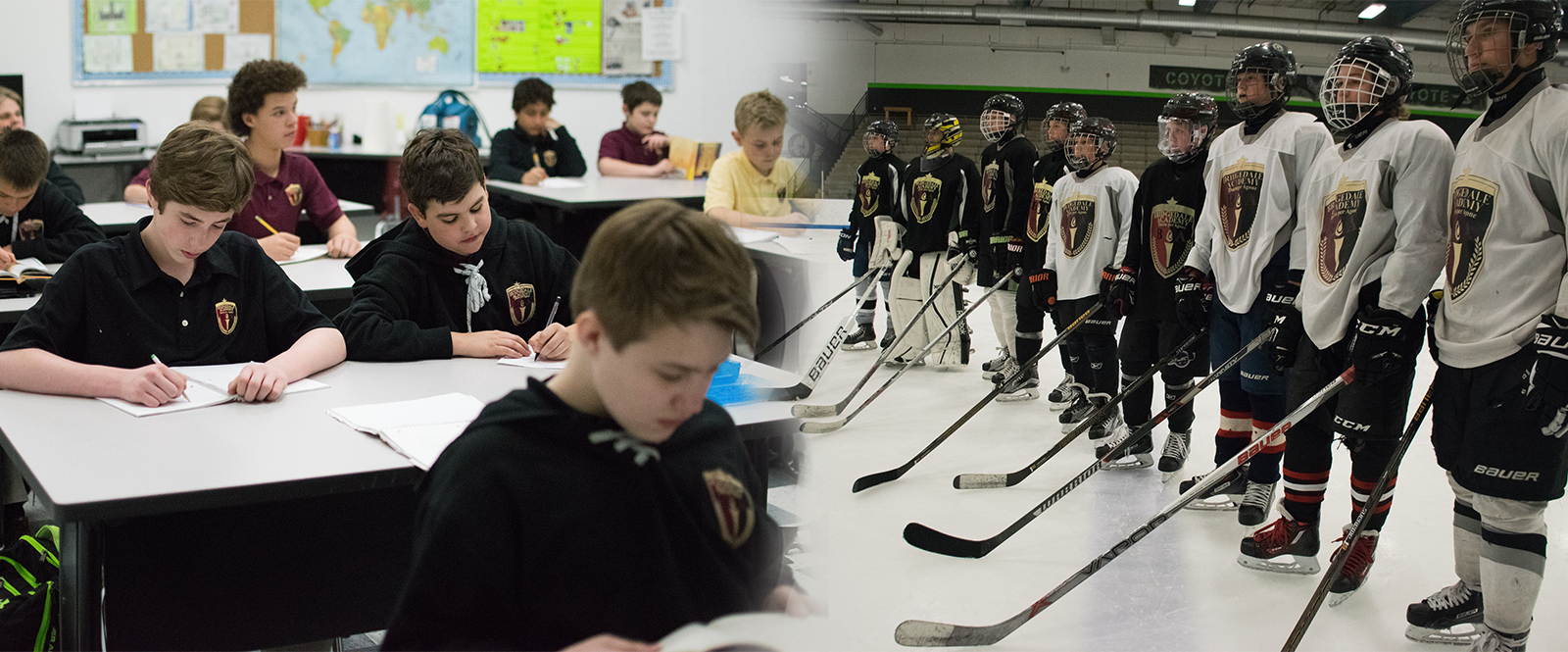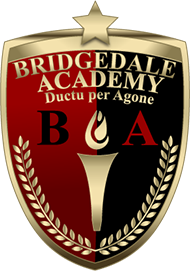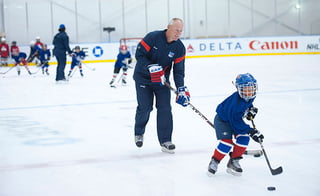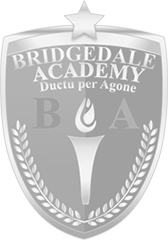The Summer Scramble to Attend Hockey Camps
by Mike McPartlin, Headmaster, Bridgedale Academy
Isn't there a better way?
Every summer, hundreds of hockey camps are operating all over North America. And no matter what skills your hockey-playing child needs to work on, there are camps out there for you.
There are camps for speed, camps for stick handling, camps for shooting, camps for checking, camps for “power” skating, camps for defensemen, etc.
Many of these camps are week-long camps, and all promise positive results.
So my question is: If positive results can come from attending a 1-week hockey camp, what kind of results could you expect from 36 weeks of hockey camp?
Some Food for Thought
Before talking about how you can get 36 weeks of hockey camp (I'll get to that below), here's some food for thought, not only about summer hockey camps, but also about maximizing the development of your hockey-playing child.
1. Extent of development at a typical week-long hockey camp
While there may be some value derived from such a camp (see Youth Hockey Development - Part 1), in my opinion it is definitely NOT the best way for a youth hockey player to develop.
For many years, I ran my own TAC Hockey camps and clinics, including a number of week-long camps.
But after a few years, I changed my approach and stopped offering week-long camps.
I realized there was a better way.
And so I made changes:
- so that the players would be physically and mentally fresher at each session
- so that the lessons learned would have time to sink in between sessions
- because skills really can't be developed properly if the player is fatigued
I began offering programs that were limited to a specific purpose. And I scheduled these programs according to a specific time frame, one that would better guarantee each player’s maximum improvement.
I offered 3 types of camps/clinics, each of which had both on-ice and off-ice components, and each of which was done within a specific time frame. They were:
- Agility Clinics (w/ 3 sessions on staggered days)
- Checking Clinics (w/ 9-10 sessions staggered over a 2-week time frame)
- Off-Season Training Programs (w/ 3 staggered sessions/week for 6 weeks)
Looking back, it's clear these changes enhanced the development of participants at my TAC Hockey programs, something I hear often from former attendees.
Evan Nielsen, NHL draftee and former D1 college player at Notre Dame, attended my Off-Season Training Program as a youth. Here’s what Evan had to say about my off-season program: "Looking back on my development as a player, the years I was able to make the greatest gains were those when I was able to participate in summer development/skill training programs like TAC."
2. Hockey is a game of skills.
From a physical development perspective hockey is, first and foremost, a game of skills. Brute force alone does NOT make a hockey player. Strength and power do matter, and they matter very much as players move up the pyramid to higher and higher levels of hockey.
(Note: this blog focuses primarily on the development of physical skills. But at least as important, and arguably MORE so, is the development of the 1) situation-recognition and 2) decision-making skills. These skills of course are the "thinking" skills and their development too is highly dependent on the player NOT being fatigued. "The first thing that goes when a player is fatigued is his brain.")
And of course a player's athleticism is also crucial to the process. (Learn about "Developing Physical Literacy" to become a high-level athlete from my 4-part series under "Recent Posts" in the column to the right.)
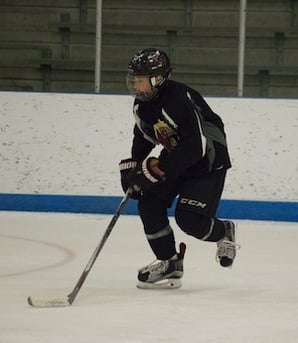 But youth hockey development is primarily about skill development.
But youth hockey development is primarily about skill development.
It is about developing proper techniques so that strength and power CAN be applied to those skills later.
3. Skills can only be developed properly when there is no fatigue.
Look at any skill, and experts who teach that skill will tell you unequivocally that the skill cannot be developed, much less mastered, while the “student” is fatigued.
This is true not only for youth hockey skills but also for something like mastering a musical instrument. It is true for baseball players and golfers, for gymnasts and figure skaters, for pole vaulters and high hurdlers. And on and on, for all skill-based activities.
No matter the skill, if fatigue has set in, you are better off NOT practicing.
Yet there is no doubt that a high percentage of the youth hockey players attending a week-long camp, especially an overnight residence camp, have become fatigued by day two or day three, and that they do not recover from that fatigue until after the camp ends.
4. Proper technique is the key to skill development.
The key to mastering any skill is proper technique. And, as suggested above, proper technique can only be maintained when the athlete is not fatigued.
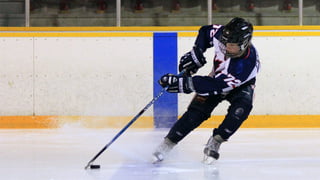 This is mainly because all skills involve the use and/or mastery of fine motor skills. The execution of most skills also requires the coordination of two or more physical activities simultaneously.
This is mainly because all skills involve the use and/or mastery of fine motor skills. The execution of most skills also requires the coordination of two or more physical activities simultaneously.
For example, if you hope to play the guitar well, your left and right hands must work together.
And of course in a sport like hockey, which requires the use of almost every muscle in the body at all times, the athlete must coordinate not only both hands, but also both feet, as well as the elbows, shoulders, hips, knees and head.
5. But proper technique is even more important than meets the eye.
To execute any athletic skill at the higher levels, the athlete must be able to apply power and strength to the skill.
But if the technique the athlete is using while attempting to execute the skill is flawed, then at some point strength will overpower the technique.
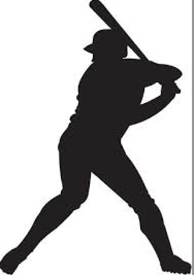 And when that happens, the skill breaks down.
And when that happens, the skill breaks down.
For example, a baseball player hoping to hit major league pitching must be able to swing the bat faster while still keeping the swing on plane. But if there is a technical flaw in his swing, then adding power to the swing will tend to exaggerate the flaw. And the player who continues trying to add strength and power to the flawed swing will simply get out of whack (for lack of a better term).
But an athlete who is executing a skill with “perfect” technique can continue to add strength and power to the skill, without having the skill break down, up to (and in theory even beyond) the limits of his strength and power.
6. To maintain proper technique in hockey the athlete must be physically fit.
Hockey is not just skill-intensive. It is also physically demanding. (A prior blog, Youth Hockey Development - Part 2, discusses the consistent commitment necessary to excel at hockey.)
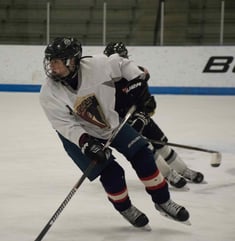 Because the execution of every skill in hockey also requires that some level of power and/or strength be applied to it, some level of fatigue is inevitable. Thus a youngster going through a hockey drill can only sustain maximum effort for around 45 seconds or so.
Because the execution of every skill in hockey also requires that some level of power and/or strength be applied to it, some level of fatigue is inevitable. Thus a youngster going through a hockey drill can only sustain maximum effort for around 45 seconds or so.
After that, he must rest and recover if he hopes to properly execute the skills in the drill without fatigue the next time through.
And so being physically fit, i.e. so that the player can fully recover between each skill-based repetition, matters a lot to skill development.
Because quality repetitions are the key to mastering any skill.
Now, to the matter at hand:
How to Get 36 Weeks of Hockey Camp!
The school year of most elementary and middle schools comprises 36 weeks of school over a 40-week time frame. This is likewise true at Bridgedale Academy.
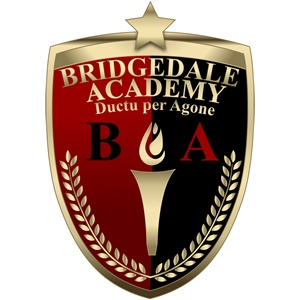 But for the serious young hockey player, there is a big difference at Bridgedale Academy.
But for the serious young hockey player, there is a big difference at Bridgedale Academy.
Because, as part and parcel of our core academic/athletic development curriculum as a youth hockey prep school, all Bridgedale Academy student-athletes receive the equivalent of 36 weeks of hockey camp. Our off-ice training is conducted by Goodman Elite Training and our on-ice training by top coaches, including from 200 x 85, arguably the top youth hockey development program in North America.
The training that our student-athletes receive at Bridgedale is specifically designed and overseen to manage the balance between hard work and recovery, so that fatigue is minimized and development of skills is maximized.
The results we have seen over the years are undeniable, and we are confident that you can ask any parent of a Bridgedale student-athlete and you’ll get the same response: my son’s development at Bridgedale has been amazing.
Add in the academic benefits of Bridgedale Academy, such as:
- We use a classical school curriculum
- Boys learn better in a boys-only school
- Smaller class sizes make a big difference
and the combination is unbeatable.
Conclusion
For many parents, enrolling their child in one or more summer hockey camp can of course be an appropriate choice.
And whether it’s choosing a summer camp, or looking at a school like Bridgedale Academy, finding the "best possible developmental environment" should be what guides your decision-making process.
"At Bridgedale we are committed to the development of our young student-athletes, helping them to develop their physical and mental skills so they can perform at their best when it matters most, no matter the arena of life that challenges them. If you would like to learn more about Bridgedale Academy, please click the button below so we can schedule a time to chat."
Mike McPartlin, Headmaster, Bridgedale Academy
Attention 4th Graders
Bridgedale Academy is accepting a limited number of 4th graders for the 2023-24 school year, on a case-by-case basis. Please call me at 708-712-5079 to inquire.
Mike McPartlin, Headmaster
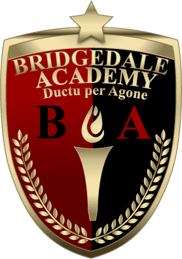
Bridgedale students LOVE going to school,
and so they THRIVE in it.
They LOVE coming to school every day.
And as a result, they are thriving.
They engage academically ...
... and so they come to love learning.
They also love that they get to work on the sport they have such passion for, while also training to become better athletes, all as part of their school day.
They train athletically ...
... and so they more fully develop their skills.
They LOVE getting so much better ... so much sooner.
They are physically fit and mentally alert ... they are thriving.
“Every shot you don't take won't go in.”
Wayne Gretzky
Bridgedale is now enrolling students for the 2023-24 School Year.
Bridgedale Academy is an all-boys school for athletes, a prep school for serious youth hockey players. We offer the 4th through 8th grades. In addition to our winning combination of sports and academics, we focus on leadership training. We use a classical academic curriculum and our graduates go on to attend some of the most prestigious high schools in the midwest, including Lake Forest Academy, Culver Military Academy, Shattuck St. Mary’s, Northwood School, Benet Academy, Fenwick Prep, Loyola Academy, St. Ignatius Prep, Marmion Academy, St. Viator, Latin School and Providence Catholic. We pride ourselves on being the top youth hockey prep school in the nation. Our grads go on to top colleges and universities, including Notre Dame, Harvard, Denver, Ohio State, Bentley, Western Michigan, Miami (OH), Boston College, Tufts, Nebraska (Omaha), Hobart, Adrian, MSOE and more. More than thirty (30) of our graduates have already received their NCAA Division 1 college hockey commitments. Seven (7) of our grads have gone on to compete for USA Hockey’s National Team Development Program (NTDP). A number of our grads have been NHL-drafted (one made his NHL debut this past season). Our grads play at all levels of college hockey and many are now playing junior hockey in the USHL, the NAHL and the OHL.
